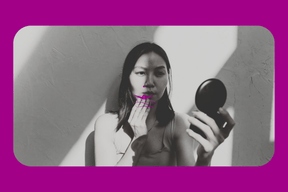To Embody Beauty
Let’s take a look at the concept of beauty… There are countless beauty ideals imposed on us by society, family, collective consciousness, the past, media, and so on. We often absorb these ideals without filtering them through our own understanding, which can have physical and emotional consequences.
Beauty has always been a subject of interest throughout history, something humanity has pursued. For instance, in art history, we frequently encounter images of the “beautiful” female body—various forms of the female body. Since the human eye seeks images that are aesthetically pleasing yet consumable, I believe that beauty has been excessively exalted throughout human history.
In modern times, not much has changed. We are bombarded by an overwhelming ideal of beauty. Beauty has become a commodity.
There are specific forms and molds, and if we don’t fit into these molds, it is assumed that we are not beautiful. On the other hand, we also unconsciously adopt the belief that we must be beautiful.
In society, beauty becomes a powerful tool in our interactions with others or in our presence in any given space. If I am beautiful, I have a higher chance of being accepted wherever I go, and many things in life seem to come easier when I am perceived as beautiful. We could say that beauty is a kind of privilege. However, if I base my entire existence on my beauty, if my sole concern is being beautiful, we start to see a deep need for acceptance and validation.
The porn and media industries, the ads we encounter every day, all the discounts and promotions—everything that imposes beauty on us is part of a larger perception game. I’ve written about how this benefits the system in previous articles.
But how often do we ask ourselves, “What do I find beautiful?” We rarely reflect on this question. Instead, we tend to accept what is imposed upon us and live accordingly.
The more we try to validate ourselves through beauty, the more we find ourselves trapped in an endless cycle of consumerism.
If my existence is validated through beauty, then there is always an “other”—the validation of my beauty depends on someone else's approval. And it’s not like I’m the only beautiful person in the world—there are over seven billion people, which inevitably leads to comparison and competition. This is where someone else's beauty starts triggering my feelings of inadequacy.
If we put as much effort into “being” as we do into trying to be beautiful, our feelings of inadequacy and existential crises would begin to lighten.
On another note, beauty creates a barrier between us and the reality of our mortality. In society, there’s this notion that as I age, my beauty diminishes. I start to envy those who are younger and more beautiful, yet every stage of life has its own wisdom, phases, and gifts.
If I’m not connected to my feminine energy, I perceive life as something fleeting…
And my fear of aging surfaces.
I still agree with the somewhat clichéd yet timeless saying, “Beauty is in the eye of the beholder,” because we engage with beauty through our gaze. We connect with beauty, observe it, and bring it into existence through our perception. We define beauty through our own filters.
When I look at beauty—while being aware of my own beauty and knowing that the beauty of another person is unique to them—I can honor that beauty.
And if I am connected to my own talents, I can only admire the other person’s connection to their own unique talents.
It’s not enough to think about beauty; it must be experienced. Deciding what is beautiful with the mind is another paradox because beauty cannot be understood logically. It evokes emotions within us and speaks to our humanity.
This is why dance is the perfect medium for touching beauty; dance is not about thinking beauty—it is about living it.


